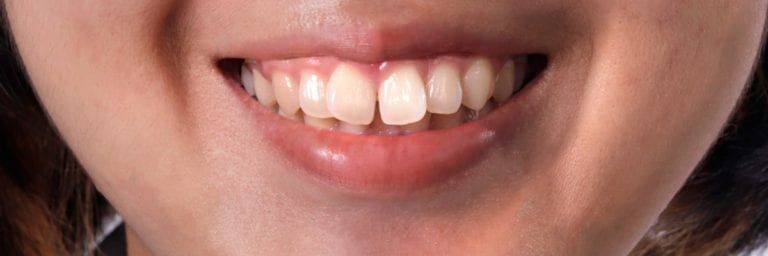Overbites come with many complications that don’t just end with aesthetics – protruding teeth often create a higher risk of damage and lead people to become more prone to cavities and gum disease. Protruding teeth that extend beyond their alignment is a concern that we as dentists often handle with patients. Its highly recommended that children and young adults with protruding teeth get treatment for this condition, but understanding why is what often gets missed. Protruding teeth have a high impact on your oral health, and we’re here to explain why.
The Causes of Protruding Teeth
For many people, protruding teeth don’t affect their daily life. It may appear unaesthetic, but often people don’t decide to straighten their teeth for numerous reasons. This condition, however, can lead to a range of causes that often lead to protruding teeth, such as:
- Genetics – As one of the most reoccurring reasons, genetics can play a heavy part in the development of protruding teeth. The development of the child’s jawline could result from the inheritance of genes from their parents.
- More or Fewer Teeth – Losing teeth as a child is a normal occurrence, but the number of teeth in your mouth that are a permanent fixture can also lead to overbites. Underbites, overcrowding, and missing teeth also contribute to the shape of the mouth and its tooth composition.
- Finger Sucking – Children sucking their thumbs as a habitual reaction towards weening can create many problems, as their palatal space in the mouth continues to develop into ages three and four, often resulting in the teeth pushed forward.
- Tongue Thrusting – When the tongue is pressed too far forward due to misalignment in the jaw, it can result in swollen tonsils, which in turn create poor swallowing habits and eventually overbites.
The Link Between Protruding Teeth and Injuries
Protruding teeth, especially in young children, are more prone to traumatic dental injures than others. According to a study conducted by Dental Traumatology, the review observed over 50,000 children under 19 years old observed that young children under six years that have protrusions up to 3mm have a three-time higher chance of developing trauma than those without protruding teeth. This statistic increases over time, as children with a 5mm protrusion have double the chance of developing dental trauma.
Trauma, dental protrusions, and long-term effects are concerns that not only affect dentists but affect families everywhere. As research continues into the topic, our goals as dentists are to encourage correcting protruding teeth to help prevent the onset of dental trauma, among other conditions. Receiving orthodontic care from an orthodontist will be able to protect your overall dental health and help prevent the onset of serious dental conditions. For more information, reach out to your dentist to learn about this condition and begin correcting your overbite.




